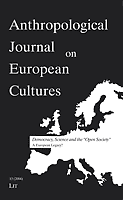The Open Society and Anthropology: An ethnographic example from Turkey
The Open Society and Anthropology: An ethnographic example from Turkey
Author(s): David ShanklandSubject(s): Anthropology
Published by: LIT Verlag
Keywords: Turkey; Open Society; Anthropology; Democracy; Rationality
Summary/Abstract: The article provides an account of the way in which the project of modern liberal statehood – democratic institutions, a separation of church and state, an impartial bureaucracy – has fared, historically and contemporarily, in the context of Turkey. Through a casestudy of Alevi peasant communities inparticular, Shankland offers a nuanced consideration of the applicability of the terms ’open’ and ’closed’ society, terms which might appear too abstract and rigid a typification (Is any ’closed’ ideology actually immune to subversion? Isany ’open’ milieu free of petty tyrannies?). The Kemalist programme of modern Turkish statehood Shankland sees as a ’Popperian’ project: secularist and rationalist. Why, then, should some of its staunchest supporters have been the Alevis: traditionalist, collectivist, religious and hierarchical?Marginal to mainstream Turkish Islam, with experience of migration both within Turkey and the wider European economic area, the Alevis found in Kemalist ’openness’ that legalistic regulation and dispersal of power which afforded security to their cultural traditionalism. Accommodation to Kemalism, moreover, has resulted in a peaceful transition for the Alevis, Shankland concludes, from the closure of cosmology and belief to the selfconscious openness of culture and belonging a transition is aware is fraught with contingencies and often now prey to more radical currents.
Journal: Anthropological Journal on European Cultures AJEC
- Issue Year: 2005
- Issue No: 13
- Page Range: 33-49
- Page Count: 17
- Language: English
- Content File-PDF

